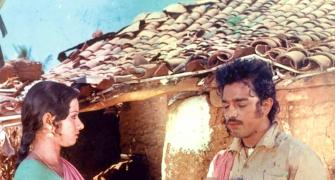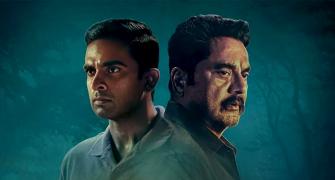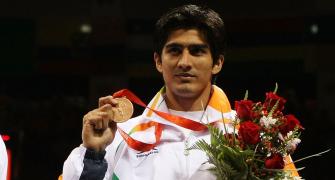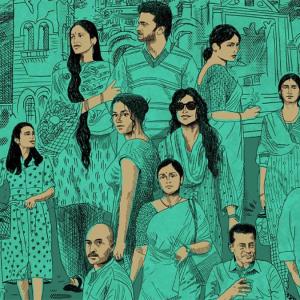Maamannan could have been so much better with an alternate lead actor and a tighter, more gripping storytelling, sighs a disappointed Divya Nair.

Pariyerum Perumal. Peranbu. Karnan. Mari Selvaraj is known to have directed some really heart-wrenching socio-political dramas with simple but impressive stories and inspirational metaphors.
His latest Tamil film Maamannan, featuring Udhayanidhi Stalin, Vadivelu, Fahadh Faasil and Keerthy Suresh, released in theatres on Friday.
In Mumbai, I struggled to book a ticket on Sunday because there was only one show and it was almost full. And why not? The excitement to watch Mari direct FaFa is justified.
In his own production, Udhayanidhi Stalin features as Athiveeran, an MLA's son, who teaches Adimurai, a traditional martial art. He also rescues pigs and takes care of them on a farm close to his home. We are told that it's been 15 years since he spoke to his father Maamannan (Vadivelu) although they live under the same roof.
Maamannan works with Rathnavel (Fahadh Faasil), an arrogant entrepreneur and politician who enjoys organising dog races for money.
When Athiveeran's college mate Leela (Keerthy) and friends seek his help to set up a free coaching institute, he offers to let them train at his academy. Soon Leela's institute is attacked by mobs from a rival coaching institute operated by Rathnavel's elder brother Shanmugavel. Adiveeran and friends retaliate by damaging Shanmugavel's institute. This irks Rathnavel.
Knowing that Athiveeran is Maamannan's son, he summons father and son for a truce meeting.
Athiveeran notices the way Rathnavel mistreats his father (Azhagam Perumal) and realises how helpless his own father has been.
One thing leads to another and soon, Rathnavel and Maamannan are pitted against each other to fight the elections and prove their supremacy.
While Rathnavel and co deploy unscrupulous means to destroy Maamannan and team, Athiveeran and Maamananan rekindle their father-son bond and unite to fight for justice of the less fortunate who have been wronged at the hands of the upper caste Rathnavel and his father.
The story line is interesting, but not engaging enough.
By the time you reach the interval, you feel so tired that you want to grab a coffee to keep awake.
And the reason for this tired feeling is Udayanidhi Stalin. He is such a bad choice for the lead role that you realise his sketches of flying pigs and dogs are more animated than all his emotions put together.
As the young boy who lost his friends and deprived of justice after they chose to bathe in a temple pond, there is no expression of angst, annoyance or vengeance.
In fact, in one of the dance sequences when Leela offers to hug him, it took me a while to understand that she is probably doing so to console him. Because this lead man's face tells us absolutely nothing of what he is thinking, feeling or planning to do next.
So what keeps us going? Fahadh Faasil, as the ruthless, poster boy of all things evil, grinning-ear-to ear and stirring up a melting pot of emotions.
When you watch him walk out of the room dressed in a crisp white shirt dotted with blood stains splattered across his face, fresh from his latest crime of passion, his eyes display no remorse.
In stark opposite, we have Vadivelu, essaying a role filled with patience, fatherly emotions and compassion.
These two actors sustain Mari's film and keep it afloat for a while.
Like in all of his previous films, there are multiple scenes of assault and violence here as well.
Among them all, the flashback scene in which some boys are stoned to death really stands out. The subtle imagery of upper caste men dominating and attempting to overthrow the helpless young boys will wrench your heart. Then you notice one of the boys scrambling to the surface -- he's bleeding but not willing to quit, almost like an image of hope and light among darkness.
It's a scene that will stay with you.
Mari exploits the image of white and black in equal measure to convey an important metaphor of inequality.
When Maamannan seeks justice from Sundaram, he is seen wearing a black shirt.
Once he comes to power, he dons white and even offers his visitors, young and old, women and men, telling them to remain seated while speaking to him. However, he hesitates to be seated in front of Rathnavel or his father, as an unspoken rule of inbuilt oppression and hypocrisy in society.
Although Vadivelu does mention about how he was addressed as 'mannu' (meaning mud/soil), an indication of subtle bullying, and how his son inspired him to fight for his dignity, the impact is missing.
Among the supporting cast, Keerthy Suresh looks gorgeous as the fearless Leela and breathes life into her scenes displaying energy and restraint wherever necessary.
The screenplay and cinematography is impressive.
While Mari once again delves into caste oppression as his theme, the execution somehow lacks the finesse and empathy explored in his former projects.
Maamannan could have been so much better with an alternate lead actor and a tighter, more gripping story.










